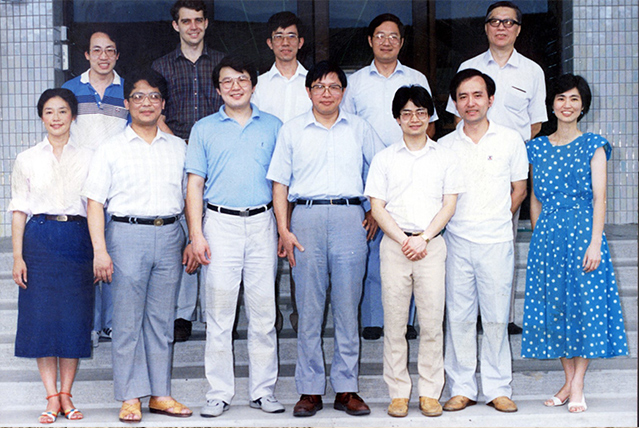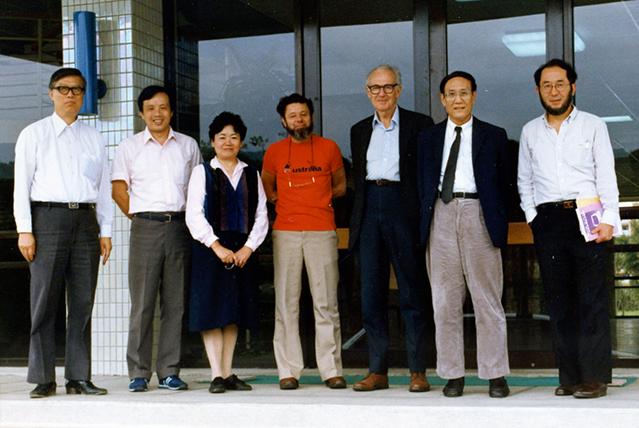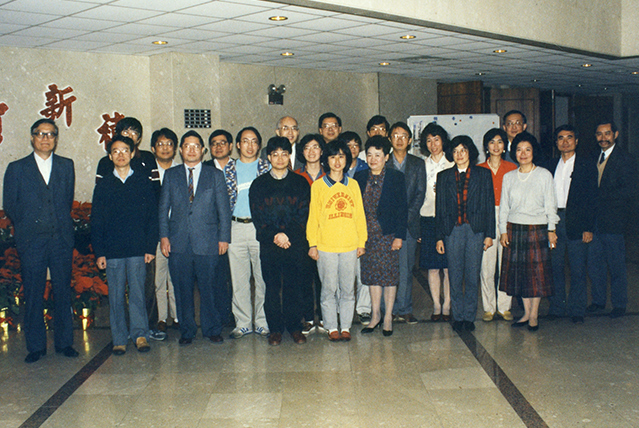IMB Founders Lectureshi
The "IMB Founders Lectureship" is created to pay tribute to a group of altruistic, dedicated and passionate scientists who, with foresight, established the "Institute of Molecular Biology (IMB)", thereby laying a solid foundation for the nation's advancement in cutting-edge biological sciences. This pivotal historical juncture underscores the founders' profound open-mindedness, selfless endeavors and fervent pursuit of ideals. Its significance cannot be overstated.
We hope the "IMB Founders Lectureship" will not only serve the purpose of expressing gratitude and commemorating the efforts and contributions of all founding members, but also provide the younger generation with a deeper understanding of the institute's ideals and historical legacy. The objective is to broadcast widely that this Institute has hosted a distinguished group of domestic and foreign scholars deserving deep respect and appreciation. In doing so, we aim to underscore the profound influence they have had on the development of molecular biology and biomedical sciences in Taiwan, as well as their selfless dedication to research for the country.

In January 1982, Academia Sinica and National Science Council (now National Science and Technology Council) jointly organized a 10-day "Genetic Engineering Symposium". In his opening remarks, Mr. Kwoh-Ting Li, who is widely recognized as the "Godfather of Science and Technology" in Taiwan, emphasized the importance of genetic engineering as a crucial strategic avenue for the industrial development of Taiwan. As a key figure in propelling technological advancement in Taiwan at that time, Mr. Li integrated the development of life sciences into government technological policy. To attract scientific talents, he personally reached out to a cohort of eminent scientists in the United States, inviting them to participate in educational and research activities in Taiwan. Under the leadership of Mr. Li and former President of Academia Sinica, Ta-You Wu, a dedicated team comprising both domestic and international scholars and experts collaborated to assist Academia Sinica in founding IMB and the Institute of Biomedical Sciences. Since then, these institutions have been deeply committed to advancing cutting-edge bioscience and medical research, as well as nurturing the next generation of researchers.
The Central Laboratory of Molecular Biology (CLMB), a predecessor of IMB, had its preparatory office established in December 1982. Academician Paul O.P. Ts’o took on the responsibility of overseeing the preparatory affairs. He assembled an esteemed Advisory Board consisting of James C. Wang, Ray Wu, Chien Ho, Ru-Chih C. Huang, Paul N. Yu, Tsong-Teh Kuo, Ming-Tsung Peng, Chok-Yung Chai, P.C. Huang, Cheng-Wen Wu, Shou-Hwa Han, and Wei-Chen Tien. Subsequently, Yaw-Huei Lin, Tsong-Teh Kuo, Cheng-Wen Wu, and Wei-Chen Tien sequentially served as interim heads of the preparatory office. To tackle the initial challenge of attracting academic intellectuals to CLMB, the preparatory office devised a relay team framework to ensure smooth operation of the Institute by inviting esteemed scientists to serve as rotating directors, each for a term of one to one and a half years.

In July 1986, Academician James C. Wang assumed the role of the inaugural rotating director, marking a new era for the Institute. Joining him were Bon-chu Chung, Jaulang Hwang, Ming-Fai Tam, and Cho-Fat Hui, enlisted as founding members. Recognizing the necessity of a strong team, Director Wang invited distinguished scholars Leroy F. Liu, Tao-Shih Hsieh, David Cheng-Pei Tu, Gloria Li, and C.-K. James Shen, affectionately known as the "Five Tigers", to join as visiting scholars. Their invaluable contributions played a crucial role in establishing the infrastructure, devising strategic research plans, and fostering collaborations with local universities.

In September 1987, Academician Ru-Chih C. Huang assumed the leadership and expanded the Institute’s research capacity by inviting additional visiting scholars into CLMB, thereby broadening the scope of research endeavors. The year of 1988 marked a significant milestone for CLMB, witnessing substantial growth by recruiting additional eight investigators to further enhance its research power. In light of Taiwan's constrained resources at the time, there was a pressing need to break down barriers among its researchers in order to optimize the allocation of both resources and talents. Academician P.C. Huang therefore introduced the “open laboratory space” concept, alongside the implementation of a laboratory stockroom system.

Academician Ray Wu assumed the position as the third rotating director in 1989, during which he introduced plant molecular biology as a new focus for CLMB. This expansion was accompanied by recruitment of two additional researchers to the Institute that year. In 1990, under the leadership of Academician Chien Ho as the fourth rotating director, CLMB ventured into the field of structural biology, with invaluable support from several eminent experts in the discipline.
During this preparatory period, visiting scholars played crucial roles in propelling CLMB’s research forward, with many maintaining close ties to the Institute and contributing to its ongoing growth and development. Subsequently, numerous individuals, such as C.-K. James Shen, Tao-Shih Hsieh, Leroy F. Liu, Hsing-Jien Kung, Wen-Hwa Lee, Michael M. C. Lai, Tuan-Hua David Ho, Andrew H.-J. Wang, and Sunney I. Chan, returned from abroad to engage in domestic academic research, actively participating in various institutions to advance cutting-edge scientific endeavor.

In 1991, Academician C. C. Wang assumed the role of the official leader of the preparatory office. Under his leadership, the Institute experienced significant development and expansion. Director Wang’s tenure culminated in the formal establishment of IMB on March 1st, 1993, marking the conclusion of the preparatory phase. Among Director Wang’s notable achievements were initiation of the construction of the Institute’s second building and implementation of a consistent seminar program. Academician Tsong-Teh Kuo also played a crucial role in the Institute’s development, serving as the interim leader of the Advisory Committee during the preparatory phase and as the acting director during Director Ray Wu’s tenure, as well as both before and after Director C. C. Wang's leadership. This continuity provided a stable foundation for the Institute’s subsequent growth.
Following Director Wang’s tenure, the Institute entered a phase of steady growth, attracting highly qualified researchers, establishing essential core facilities, and fostering an environment conducive to pioneering research. In February 1995, Academician C.-K. James Shen assumed the directorship, holding the position until 2004. Academician Meng-Chao Yao then took over as director from 2004 to 2013, succeeded by Academician Soo-Chen Cheng, who served until 2019. Currently, Dr. Hwai-Jong Cheng has been serving as director since assuming the role in July 2020.